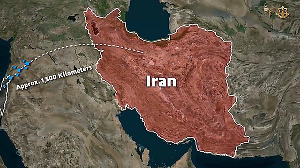A group of American experts and ex-officials have criticised the Indo-US civilian nuclear agreement and said the Bush Administration's proposal was damaging to the international non-proliferation regime.
The group also warned lawmakers against approving the deal in its present form.
'The proposal for civilian nuclear cooperation with India poses far reaching and potentially adverse implications for US nuclear non-proliferation objectives and promises to do little in the long run to bring India into closer alignment with other US strategic objectives,' the letter written by 18 experts to Congress said.
According to the signatories, the proposed civilian nuclear deal 'may also undermine our ability to win necessary international support for persuading Iran to abandon its fuel-cycle plans and to make its nuclear programme fully transparent' to the International Atomic Energy Agency.
Those who signed the letter include Republicans Henry Rowen and Henry Sokolski, both one time senior officials at the Pentagon, and John Holum and Robert Einhorn -- formerly of the Clinton administration at the State Department.
What is being pointed out is that American laws bar cooperation with countries that are not party to the NPT and do not allow full and surprise access by the IAEA.
'So far India has pledged to accept voluntary safeguards over civilian nuclear facilities of its choosing,' details of the letter published in the Washington Times on Monday said.
Commenting on the contents of the letter last week, State Department Spokesman Sean McCormack said the administration is looking forward to discussing the concerns of the House of Representatives and the Senate -- both of which have had three hearings in all on the issue.
'But at the end of the day, we think that the majority will see that this is the right deal for America, as well as for global non-proliferation efforts,' he had said.
Pakistan's Ambassador Jehangir Karamat said that any new legislation that is going to come about as a result of the Washington-New Delhi understanding should not be India-specific and be seen as the US 'going out on a limb' for just one country.
"If the same terms were open to other qualifying countries that would give it more balance in our eyes."
Also read:
Column: Do we really need the nuclear deal with the US?
Column: The nuclear deal
Deal unique to India: Burns
Complete Coverage: India goes nuclear






